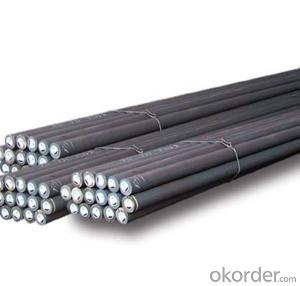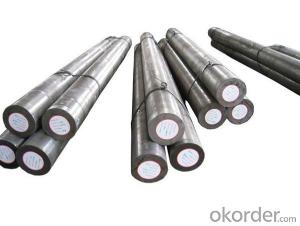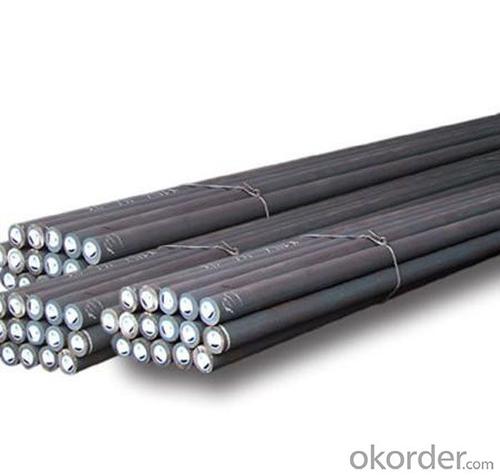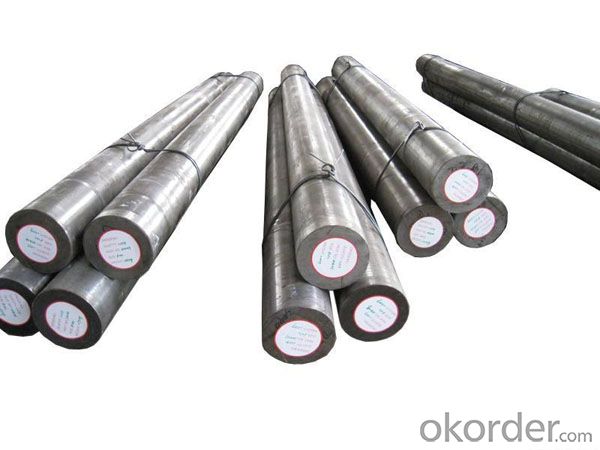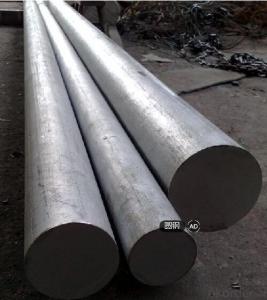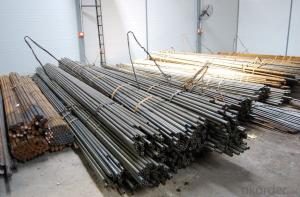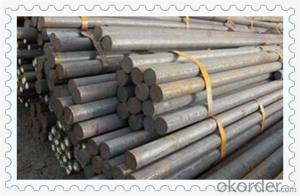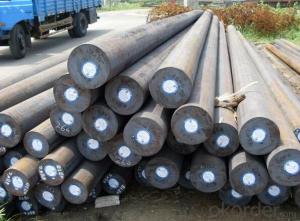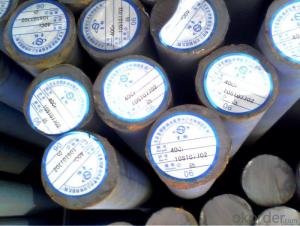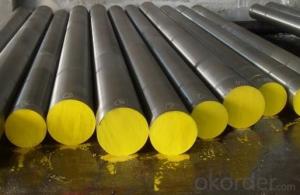Special Steel1.2344 Die Steel Bar Round Bars
- Loading Port:
- China main port
- Payment Terms:
- TT OR LC
- Min Order Qty:
- 30 m.t.
- Supply Capability:
- 10000 m.t./month
OKorder Service Pledge
OKorder Financial Service
You Might Also Like
Specification
Chemical Composition%
| Country | Standard | C | Si | Mn | Cr | Mo | V | S | P |
| China(GB) | 4Cr5NoSiV1 | 0.32-0.45 | 0.80-1.20 | 0.20-0.50 | 4.75-5.50 | 1.10-1.75 | 0.80-1.20 | ≤0.030 | ≤0.030 |
| USA(ASTM) | H13 | 0.32-0.45 | 0.80-1.20 | 0.20-0.50 | 4.75-5.50 | 1.10-1.75 | 0.80-1.20 | ≤0.030 | ≤0.030 |
| Germany(DIN) | 1.2344 | 0.37-0.42 | 0.90-1.20 | 0.30-0.50 | 4.80-5.50 | 1.20-1.50 | 0.90-1.10 | ≤0.030 | ≤0.030 |
| Japan(JIS) | SKD61 | 0.37-0.42 | 0.90-1.20 | ≤0.50 | 4.50-5.50 | 1.00-1.50 | 0.80-1.20 | ≤0.030 | ≤0.030 |
Available Size
Rolled round bar:φ12-80mm × L
Forged round bar:φ85-600mm × L
Applications: Suitable for aluminum and copper die-casting moulds working for long time at elevated temperatures,hot extrusion dies,core rod forging dies,plastic moulds,etc,also suitable for heat resistance thimbles,push rods and ejector sleeves
Main Product
Plastic Mould Steel
DIN 1.2311,1.2738,1.2083,1.2316 etc.
AISI P20,P20+Ni,420 etc.
JIS SUS420J2
Hot Work Steel
DIN 1.2344,1.2343,1.2367,1.2365,1.2581,1.2713 etc.
AISI H13,H11,H10,H21, etc.
JIS SKD61,SKD6,SKD5,SKT4 etc.
Cold Work Steel
DIN 1.2739, 1.2601, 1.2080, 1.2436, 1.2631, 1.263, 1.2510, 1.2327 etc.
AISI D2, D5, D3, D6, A8, A2, O1 etc.
JIS SKD10, SKD11, SKD1, SKS3 etc.
High Speed Steel
DIN 1.3343, 1.3243, 1.3247, 1.3355 etc.
AISI M2, M35, M42, T1 etc.
JIS SKH51, SKH35, SKH59, SKH2 etc.
Alloy Structural Steel
DIN 1.7035,1.6511,1.7220,1.7225 etc.
AISI 5140, 4340, 4135, 4140 etc.
JIS SCr440,SNCM439,SCM435,SCM440 etc.
Stainless & Carbon Steel or Others
DIN 1.4125,1.1191 etc
AISI 440C,1045, 1020 etc.
JIS SUS440C,S45C etc
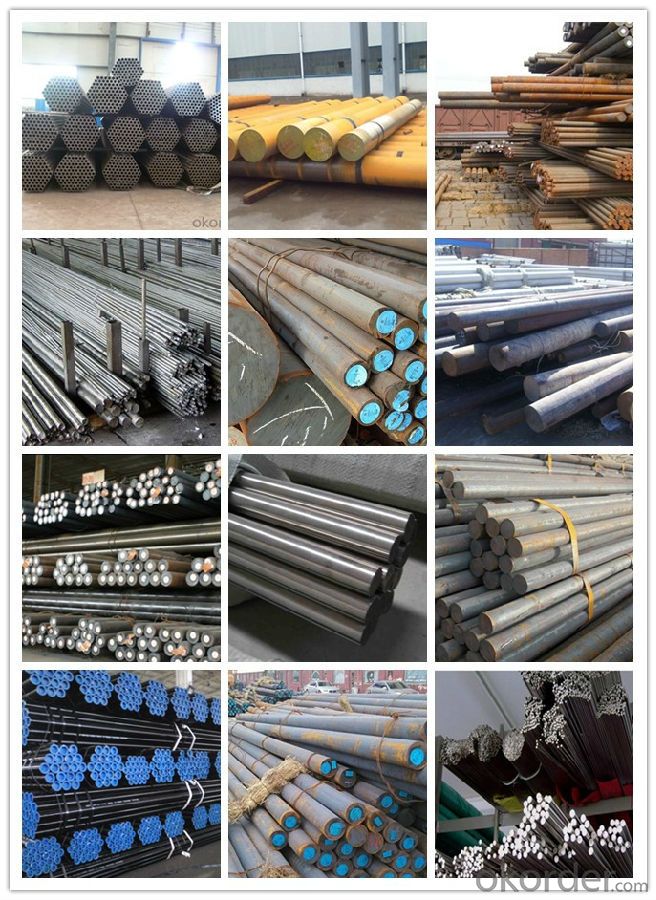 Product show
Product show
Workshop show
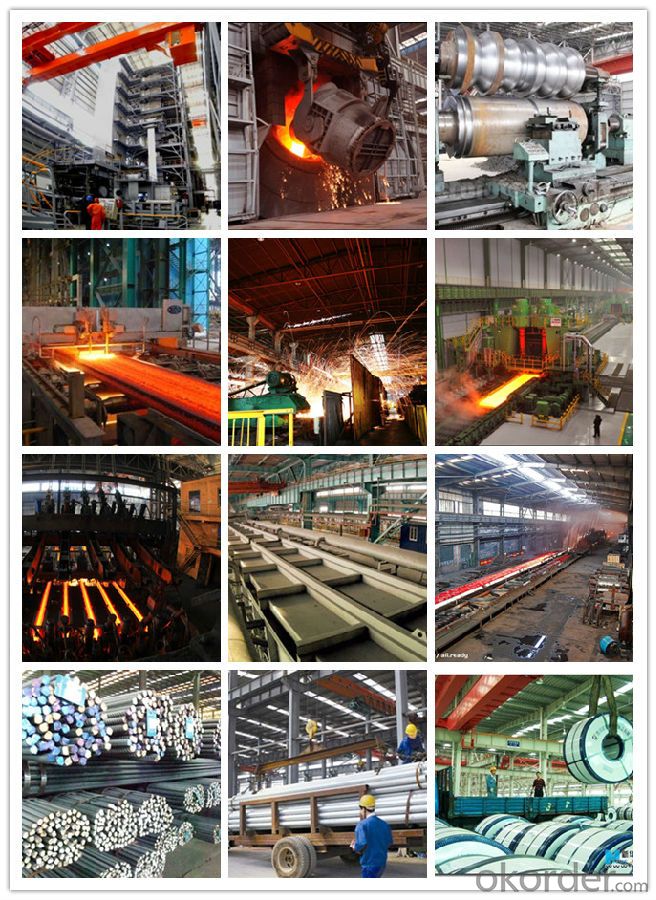
Shipping
1. FedEx/DHL/UPS/TNT for samples, Door-to-Door;
2. By Air or by Sea for batch goods, for FCL; Airport/ Port receiving;
3. Customers specifying freight forwarders or negotiable shipping methods!
Delivery Time: 3-7 days for samples; 5-25 days for batch goods.
Payment Terms
1.Payment: T/T, L/C, Western Union, MoneyGram,PayPal; 30% deposits; 70% balance before delivery.
2.MOQ: 1pcs
3.Warranty : 3 years
4.Package Informations: 1) EXPORT, In 20 feet (GW 25 ton) or 40 feet Container (GW 25 ton)
2)as customer's requirement
Why choose us?
(1) The leading exporter in China special steel industry.
(2) Large stocks for various sizes, fast delivery date.
(3) Good business relationship with China famous factories.
(4) More than 7 years steel exporting experience.
(5) Good after-sales service guarantee.
- Q: How does special steel perform in high-pressure environments?
- Special steel performs exceptionally well in high-pressure environments due to its high tensile strength, excellent corrosion resistance, and ability to withstand extreme temperatures. Its superior mechanical properties make it highly suitable for applications such as oil and gas pipelines, pressure vessels, and offshore drilling equipment, where it can effectively handle the intense pressures and maintain structural integrity even under harsh conditions.
- Q: What are the specific requirements for special steel used in the textile machinery industry?
- The special steel requirements for the textile machinery industry can differ based on the specific application and machinery involved. Nevertheless, there are several common requirements in this industry. Firstly, corrosion resistance is crucial as textile machinery is frequently exposed to moisture, chemicals, and other corrosive substances. Therefore, the special steel used must possess excellent corrosion resistance properties to ensure durability and longevity. Secondly, high strength is necessary since textile machinery operates under high loads and stresses. Consequently, the special steel employed must have strong characteristics to withstand these forces and prevent deformation or failure. Furthermore, wear resistance is important as textile machinery involves constant contact between different components, leading to wear and tear. Thus, the special steel utilized should exhibit good wear resistance properties to minimize friction and extend the machinery's lifespan. Additionally, heat resistance is vital as textile machinery often operates at high temperatures due to friction generated during the manufacturing process. Consequently, the special steel used should possess exceptional heat resistance to prevent deformation or loss of mechanical properties under high temperature conditions. Moreover, machinability is necessary for the special steel used in the textile machinery industry. This allows for the production of complex components with precise dimensions, ensuring smooth and efficient machinery operation. Lastly, cost-effectiveness is crucial while meeting all the aforementioned requirements. Manufacturers strive to balance performance and cost to maintain competitiveness in the market without compromising on quality. It is important to note that these requirements can vary depending on the specific application within the textile machinery industry. As a result, manufacturers and engineers must carefully evaluate their machinery's requirements and choose the appropriate special steel accordingly.
- Q: What are the different heat-resistant grades of special steel?
- There are several heat-resistant grades of special steel that are specifically designed to withstand high temperatures and thermal stress. Some of the commonly used heat-resistant grades include: 1. Stainless Steel 310: This grade of stainless steel is known for its excellent resistance to high temperatures, oxidation, and corrosion. It can withstand temperatures up to 1100°C (2012°F) and is often used in furnace parts, heat treatment baskets, and other heat-intensive applications. 2. Inconel 600: Inconel 600 is a nickel-chromium alloy that offers exceptional resistance to high temperatures and oxidation. It can operate effectively in temperatures ranging from cryogenic to 1093°C (2000°F) and is widely used in gas turbines, heat exchangers, and other high-temperature environments. 3. Hastelloy C-276: Hastelloy C-276 is a nickel-molybdenum-chromium alloy that offers excellent resistance to a wide range of corrosive environments and high temperatures. It can withstand temperatures up to 1093°C (2000°F) and is commonly used in chemical processing, power generation, and pollution control applications. 4. Titanium Grade 2: Titanium Grade 2 is a commercially pure titanium alloy that exhibits good resistance to high temperatures and corrosion. It can operate effectively in temperatures up to 538°C (1000°F) and is often used in heat exchangers, chemical processing equipment, and marine applications. 5. Alloy 617: Alloy 617 is a nickel-chromium-cobalt-molybdenum alloy that offers exceptional strength and resistance to high-temperature environments. It can withstand temperatures up to 1204°C (2200°F) and is commonly used in gas turbines, petrochemical plants, and other heat-intensive industries. These are just a few examples of the heat-resistant grades of special steel available in the market. The selection of the appropriate grade depends on the specific temperature requirements, corrosion resistance, and mechanical properties needed for the application.
- Q: How does special steel perform in corrosive chemical environments?
- Special steel performs well in corrosive chemical environments due to its high resistance to corrosion. It is specifically designed to withstand exposure to various corrosive chemicals, such as acids and alkalis, without deteriorating or losing its structural integrity. This makes it a reliable choice for applications in industries such as chemical processing, oil and gas, and marine environments where corrosion is a significant concern.
- Q: Can special steel be used in railway applications?
- Yes, special steel can be used in railway applications. Special steel, also known as alloy steel or high-strength steel, possesses unique properties that make it suitable for various demanding applications, including railways. Special steel offers superior strength, durability, and resistance to wear, making it ideal for railway components that are subjected to high loads, vibrations, and extreme conditions. In railway applications, special steel is commonly used for manufacturing rails, wheels, axles, and other critical components. Rails made from special steel can handle heavy train traffic and provide a smooth and stable ride while resisting wear and deformation. Special steel wheels and axles offer high strength and toughness, ensuring safe and reliable operation even under heavy loads and high-speed conditions. Additionally, special steel is often used in the construction of railway bridges, tunnels, and other infrastructure projects. Its exceptional strength and resistance to corrosion and fatigue make it suitable for supporting heavy trains and withstanding the environmental challenges of railway construction. Moreover, the use of special steel in railway applications can contribute to cost savings and efficiency improvements. Its high durability and resistance to wear reduce the need for frequent maintenance and replacement, leading to lower maintenance costs and extended service life for railway components. Overall, special steel provides the necessary strength, durability, and performance required for railway applications. Its unique properties make it an ideal choice for ensuring the safety, reliability, and efficiency of rail transportation systems.
- Q: What is the process of manufacturing special steel?
- To produce high-quality and durable special steel with specific properties, several steps must be taken in the manufacturing process. Firstly, the raw materials needed for special steel production, such as iron ore, coal, chromium, nickel, and manganese, are selected meticulously based on the desired properties of the final product. Once the raw materials have been chosen, they are melted in large furnaces, either through the use of electric arc furnaces or basic oxygen furnaces. These furnaces subject the raw materials to extremely high temperatures, transforming them into molten metal. After the raw materials have been melted, the molten metal undergoes a refining process to eliminate any impurities. Techniques such as degassing, desulphurization, and deoxidation are employed to ensure that the steel is free from unwanted elements that could have a negative impact on its properties. Next, alloying elements are added to the molten metal after the refining process to achieve the desired properties. The proportion and specific alloying elements utilized depend on the intended application of the special steel. The molten steel is then poured into a continuous casting machine, which solidifies it into semi-finished products known as billets, blooms, or slabs. This continuous casting process guarantees a consistent and uniform structure throughout the steel. The semi-finished products are reheated and passed through a series of hot rolling mills. This process involves reducing the thickness and shaping the steel into various forms, including bars, rods, plates, or sheets, depending on the intended use. Following hot rolling, the steel may undergo heat treatment processes like annealing, quenching, tempering, or case hardening. These treatments further enhance the mechanical properties of the steel, such as its hardness, toughness, and ductility. The final step involves surface finishing and quality control measures. The steel is thoroughly inspected for any defects or imperfections that may have occurred during the manufacturing process. Surface treatments like pickling or galvanizing can also be applied to enhance the steel's appearance and protect it from corrosion. In conclusion, manufacturing special steel is a complex and precise operation that involves careful selection of raw materials, melting, refining, alloying, continuous casting, hot rolling, heat treatment, and finishing. These steps ensure that the resulting steel meets the specific requirements and performance characteristics demanded by various industries.
- Q: How does stainless steel contribute to architectural design?
- Stainless steel contributes to architectural design by providing a modern and sleek aesthetic, durability, and versatility. It can be used for various architectural elements such as cladding, roofing, handrails, and structural components. Its corrosion resistance and ability to withstand harsh environmental conditions make it a popular choice for both interior and exterior applications. Additionally, stainless steel can be easily fabricated into different shapes and sizes, allowing architects to create unique and innovative designs that enhance the overall appearance of buildings.
- Q: How does special steel perform in terms of high-temperature strength?
- Special steel performs exceptionally well in terms of high-temperature strength. It exhibits excellent resistance to deformation, creep, and oxidation at elevated temperatures, making it suitable for various applications that require stability and strength under extreme heat conditions.
- Q: What are the main characteristics of creep-resistant steel forgings?
- Creep-resistant steel forgings possess several key characteristics that make them suitable for high-temperature applications where the material is exposed to prolonged stress and heat. Firstly, creep-resistant steel forgings are known for their excellent resistance to creep deformation. Creep is the gradual deformation that occurs under constant load and elevated temperatures over an extended period. These forgings are designed to resist this deformation and maintain their shape and structural integrity, making them ideal for applications such as turbine blades, boiler components, and other high-temperature environments. Another important characteristic of creep-resistant steel forgings is their high strength. These forgings are manufactured using alloying elements like chromium, molybdenum, and vanadium, which enhance the material's tensile strength and provide excellent resistance to deformation and fracture under high-stress conditions. This strength is crucial in ensuring the forgings can withstand the demands of the application and perform reliably over time. Additionally, creep-resistant steel forgings exhibit good oxidation and corrosion resistance. The alloying elements provide a protective layer on the surface of the forgings, preventing oxidation and corrosion at high temperatures. This resistance is vital in preventing degradation of the material and maintaining its mechanical properties, even in harsh environments. Moreover, creep-resistant steel forgings offer excellent thermal stability. They can withstand extreme temperature variations without significant dimensional changes or loss of mechanical strength. This stability is crucial in applications where rapid heating and cooling cycles occur, ensuring the forgings can maintain their performance under challenging conditions. Furthermore, creep-resistant steel forgings have excellent fatigue resistance. Fatigue is the weakening of a material caused by cyclic loading, and it is particularly relevant in high-temperature applications due to the combination of stress and heat. These forgings are designed to withstand cyclic loading and maintain their mechanical properties, reducing the risk of fatigue failure and enhancing the overall reliability of the component. In summary, the main characteristics of creep-resistant steel forgings include resistance to creep deformation, high strength, good oxidation and corrosion resistance, thermal stability, and excellent fatigue resistance. These characteristics make creep-resistant steel forgings a reliable and durable choice for applications that require resistance to high temperatures, stress, and prolonged exposure to challenging environments.
- Q: What are the main characteristics of pressure vessel steel forgings?
- Pressure vessel steel forgings have several main characteristics that make them suitable for use in pressure vessels. Firstly, pressure vessel steel forgings are known for their high strength and toughness. This is crucial as pressure vessels are typically subject to high levels of internal pressure, and the steel must be able to withstand this without deforming or rupturing. The forgings are carefully designed and manufactured to ensure they have the necessary strength and toughness to withstand these pressures. Secondly, pressure vessel steel forgings have excellent resistance to corrosion. As pressure vessels often contain fluids or gases that can be corrosive, it is important that the steel used in their construction is resistant to corrosion. This helps to ensure the longevity and reliability of the pressure vessel. The steel forgings are often made with specific alloying elements that enhance their corrosion resistance. Another important characteristic of pressure vessel steel forgings is their ability to maintain their mechanical properties at high temperatures. Pressure vessels may be subjected to elevated temperatures due to the nature of the process or fluid they are containing. The forgings are designed to retain their strength and toughness even under these high-temperature conditions, ensuring the safety and reliability of the pressure vessel. Furthermore, pressure vessel steel forgings are typically manufactured with strict quality control measures in place. This is necessary to ensure that the forgings meet the required standards and specifications for pressure vessel applications. The manufacturing process includes thorough inspections, testing, and documentation to ensure that the forgings meet the necessary quality and safety requirements. Overall, the main characteristics of pressure vessel steel forgings include high strength and toughness, excellent corrosion resistance, the ability to withstand high temperatures, and strict quality control measures. These characteristics make pressure vessel steel forgings ideal for use in pressure vessels, providing the necessary strength, reliability, and safety required in such applications.
Send your message to us
Special Steel1.2344 Die Steel Bar Round Bars
- Loading Port:
- China main port
- Payment Terms:
- TT OR LC
- Min Order Qty:
- 30 m.t.
- Supply Capability:
- 10000 m.t./month
OKorder Service Pledge
OKorder Financial Service
Similar products
Hot products
Hot Searches
Related keywords
